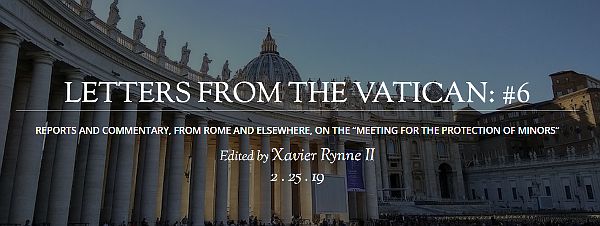
Jeg nevnte de første to brevene skrevet av Xavier Rynne II for noen dager siden (se her) om bispesynoden “FOR THE PROTECTION OF MINORS”, og her tar jeg meg de viktigste delene av hans brev nr. 6 (se også brev 3, brev 4 og brev 5):
1. Did the summit recognize that sexual abuse is a global plague?
Even prior to the summit, Father Federico Lombardi, S.J., made this point and suggested that the Church ought to make combatting sexual abuse a pastoral priority. There seemed to be a tacit recognition of this among many of the participants. And the pope laid out the available facts in a lucid and concise way in his discorso concluding the meeting. ….
2. Did the summit recognize that, in a Catholic context, this is a crisis of fidelity that cannot be resolved by “best practices” alone?
Yes and no. …
3. Did the summit avoid using “clericalism” as an all-purpose explanatory factor in the sexual abuse crisis?
There were numerous references to the abuse of sacerdotal and episcopal power during the meeting, including a lengthy section of the pope’s final statement. And no one should doubt that “clericalism” in this sense of the term—taking advantage of the reverence for the priesthood and episcopate that is deep in Catholic DNA—was and is a factor in sexually abusive behavior by clergy. What was not said, or at least not said often enough and crisply enough, is that “clericalism” in this sense is a facilitator of sexual abuse, not its cause. ….
4. Did the meeting recognize that optional celibacy is not the answer to the abuse crisis?
Few participants in the summit seem to have bought the line being peddled by some in the meeting’s Off-Broadway dimension, that a married clergy would mitigate the crisis of clerical sexual abuse. …..
5. Did the meeting underscore the importance of a deep reform of seminaries?
This theme came up frequently, and it was good that it did. What is now necessary is another “exchange of gifts”: namely, those seminary programs that are models of reform (many of which are in the Anglosphere) helping other seminary programs (in old and new Europe, Latin America, Africa, and Asia) …
6. Did the meeting recognize that the abuse crisis is also a crisis of episcopal credibility?
If there was an “American issue” at the summit, this was it, and in many respects the meeting vindicated the approach that the American bishops have been trying to take (impeded on occasion by the Vatican) since the 2018 Summer of Shame. At least half of the twenty-one points for reflection proposed by the pope reflected American experience and American practice since 2002. …..
7. Did the meeting encourage bishops to treat their priests as sons and fellow-workers in a unified diocesan presbyterate?
This may have come up in the meeting’s small-group discussions, but it did not figure prominently in the summit’s public sessions. ….
8. Did the meeting recognize that episcopal authority is strengthened, not weakened, by drawing on the expertise of dedicated laity in the governance of the Church?
As suggested in #6 above, the door now seems open, across the world Church, to serious collaboration between bishops and laity in addressing the sexual abuse crisis and in addressing issues of episcopal accountability. This is a very tough idea for the standard Curial mentality to grasp, but ….
9. Did the meeting grapple with the need for reformed criteria by which bishops are selected?
In a word, no. But the critiques of episcopal misgovernance that were heard for four days surely point toward the necessity of such a reform. …
10. Did the meeting grasp that deep and authentic Catholic reform is every Catholic’s responsibility?
There was insufficient discussion of this, as there was insufficient discussion of the more comprehensive crisis of chastity in the Church. The Holy Father’s closing statement, however, pointed in this direction, and it is surely a theme to be stressed in the months and years ahead. ….
There was even modest progress on another issue that went largely, and unfortunately, unremarked during the meeting: the relationship of doctrinal dissent to the abuse crisis. ….
….. Perhaps (this is) the end of the beginning, in the struggle to get “Rome” to understand that the Americans were not exaggerating the gravity of the situation and its impact on the Church’s evangelical mission. Perhaps the end of the beginning of the struggle to get hidebound or fearful bishops to understand that engaging the collaboration of knowledgeable lay people does not diminish their authority but enhances it. Perhaps.
For the moment, no further damage was done. And a door that was closed this past November seems now to have been opened. So full marks to those who made some modest but real accomplishments possible—and who gave the people they serve grounds for hope.
